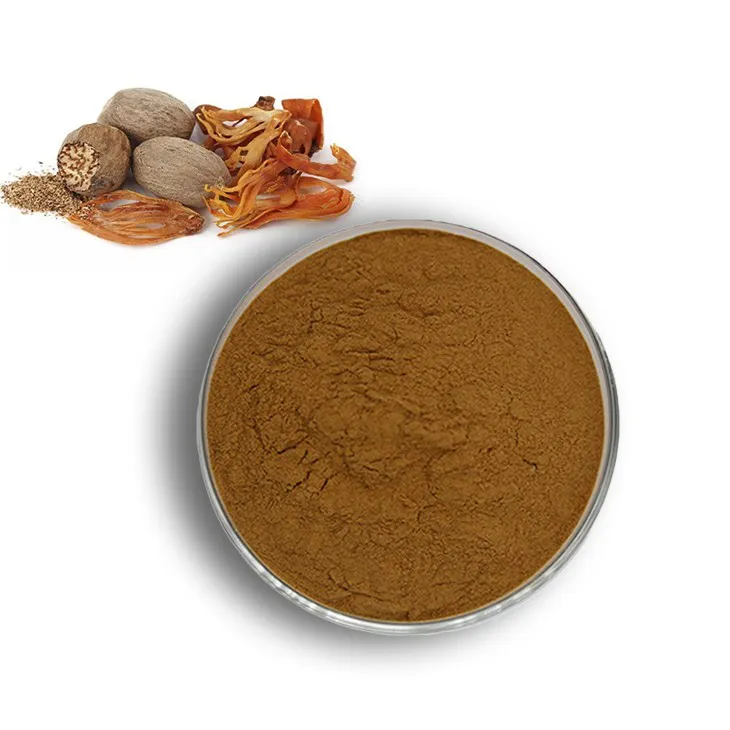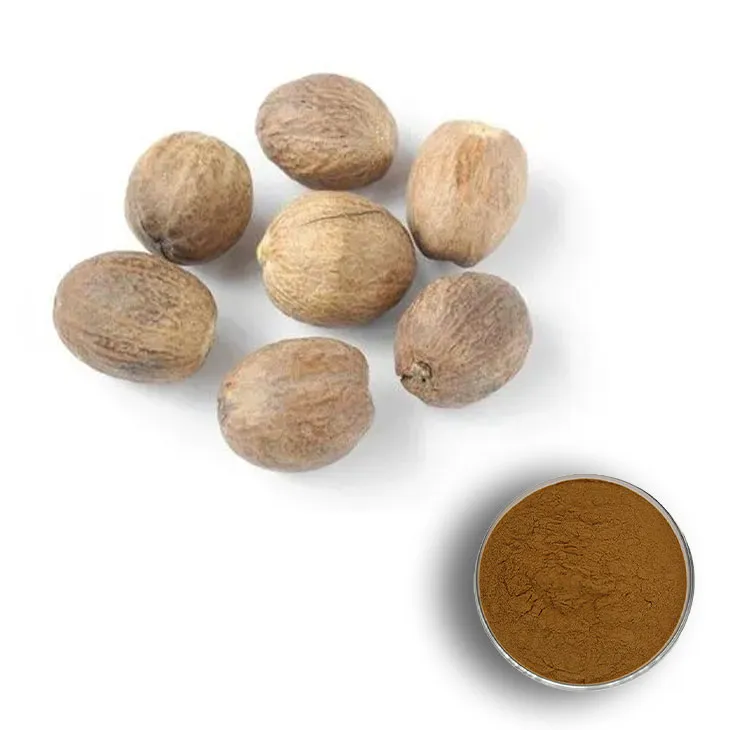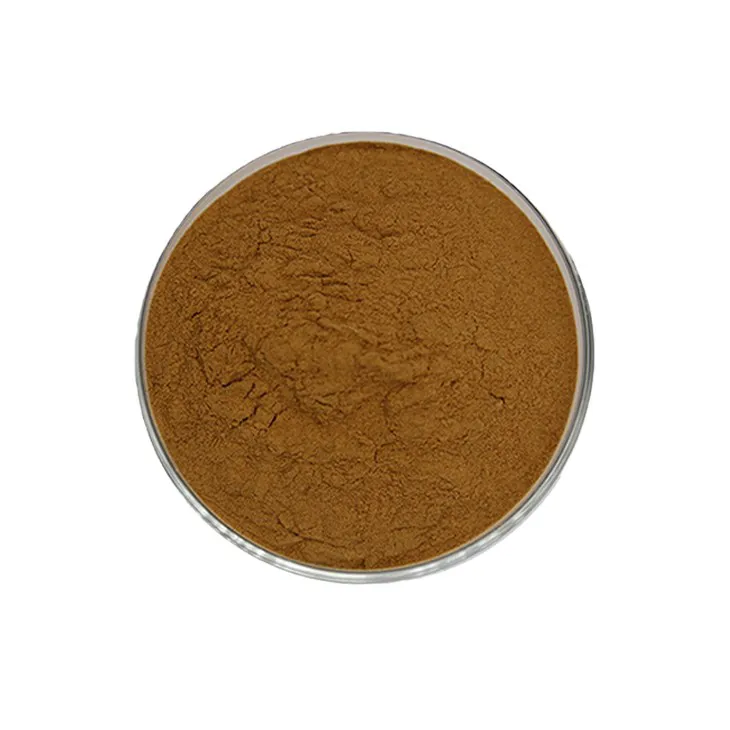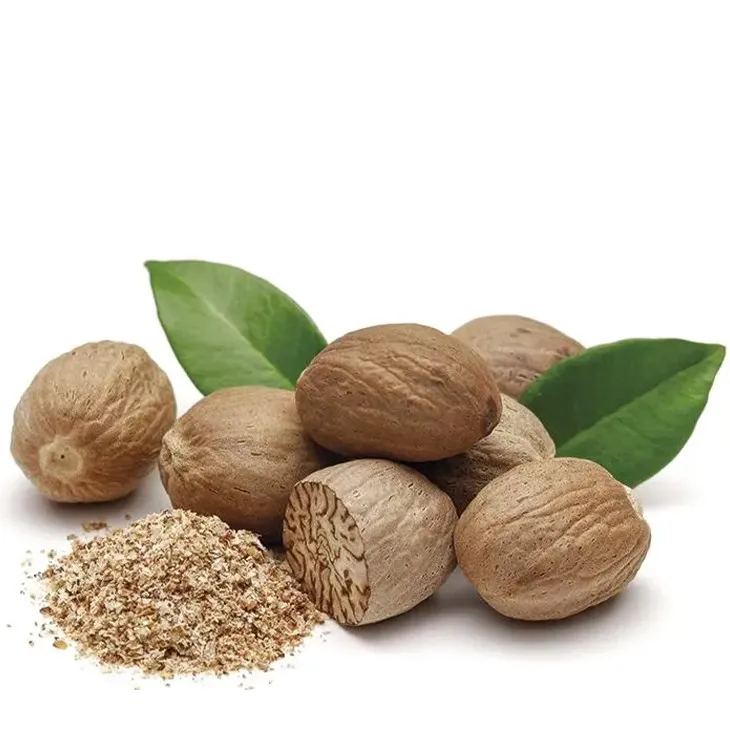- 0086-571-85302990
- sales@greenskybio.com
Best Answers to 7 Key Questions about Nutmeg Extract.
2024-12-23

1. What is Nutmeg Extract?
Nutmeg Extract is a concentrated form of the beneficial compounds found in nutmeg. Nutmeg, which comes from the Myristica fragrans tree, is a spice that has been used for centuries in cooking and traditional medicine. The extract is obtained through various methods and contains a range of chemical components such as myristicin, elemicin, and safrole, which contribute to its unique properties.

2. How is Nutmeg Extract Made?
There are several methods for making nutmeg extract:
(a) Solvent Extraction
- One common method is solvent extraction. In this process, a suitable solvent such as ethanol or hexane is used. The nutmeg is ground into a fine powder, and then the solvent is added. The mixture is stirred or agitated for a period of time, usually several hours to days. During this time, the desired compounds from the nutmeg dissolve into the solvent. - After that, the solvent - nutmeg mixture is filtered to separate the solid nutmeg particles from the liquid extract - solvent solution. The solvent is then removed through evaporation, leaving behind the concentrated nutmeg extract.
(b) Supercritical Fluid Extraction
- Supercritical fluid extraction is a more advanced method. Carbon dioxide (CO2) is often used as the supercritical fluid. At specific pressure and temperature conditions, CO2 reaches a supercritical state where it has properties of both a gas and a liquid. - The nutmeg is placed in a chamber with the supercritical CO2. The supercritical fluid penetrates the nutmeg and selectively extracts the desired compounds. When the pressure is released, the CO2 returns to a gaseous state, leaving behind the pure nutmeg extract. This method has the advantage of being more environmentally friendly and producing a cleaner extract as there is no solvent residue.

3. What are the Health Benefits of Nutmeg Extract?
Nutmeg extract offers several potential health benefits:
- Digestive Aid: It can stimulate the digestive system. Compounds in nutmeg extract may help increase the production of digestive enzymes, which can improve the breakdown and absorption of food. For example, it may relieve symptoms of indigestion such as bloating and stomach discomfort.
- Anti - Inflammatory Properties: The extract contains anti - inflammatory compounds. These can help reduce inflammation in the body, which is associated with various chronic diseases such as arthritis. By reducing inflammation, it may also contribute to pain relief.
- Antioxidant Activity: Nutmeg extract is rich in antioxidants. Antioxidants help protect the body's cells from damage caused by free radicals. Free radicals are unstable molecules that can damage cells and contribute to aging and diseases such as cancer. By neutralizing free radicals, nutmeg extract may play a role in maintaining overall health.
- Possible Mood - Enhancing Effects: There is some evidence to suggest that nutmeg extract may have mood - enhancing properties. It may interact with neurotransmitters in the brain, such as serotonin, which is associated with mood regulation. However, more research is needed in this area.

4. Are There Any Side Effects of Nutmeg Extract?
While nutmeg extract has potential benefits, it also has some possible side effects:
- Toxicity in High Doses: Nutmeg contains myristicin, which can be toxic in large amounts. If consumed in excessive quantities, nutmeg extract may cause symptoms such as nausea, vomiting, dizziness, and in severe cases, hallucinations. It is important to use nutmeg extract in moderation.
- Allergic Reactions: Some people may be allergic to nutmeg or its extract. Allergic reactions can range from mild symptoms such as skin rashes and itching to more severe reactions such as difficulty breathing.
- Interaction with Medications: Nutmeg extract may interact with certain medications. For example, it may affect the way drugs are metabolized in the body. If you are taking medications, it is advisable to consult a healthcare provider before using nutmeg extract.

5. How is Nutmeg Extract Used in the Food Industry?
In the food industry, nutmeg extract is used in a variety of ways:
- Flavoring Agent: It is a popular flavoring ingredient in baked goods such as cakes, cookies, and pies. The warm, spicy flavor of nutmeg extract adds depth and complexity to the taste of these products. It is also used in dairy products like custards and ice creams to give a unique flavor.
- Seasoning in Savory Dishes: Nutmeg extract can be used as a seasoning in savory dishes. It pairs well with meat dishes, especially those with a rich, creamy sauce. It can also be added to vegetable dishes, such as mashed potatoes or spinach, to enhance their flavor.
- Beverage Flavoring: In the beverage industry, nutmeg extract is used to flavor drinks. It can be added to hot beverages like coffee and tea, as well as cold beverages such as cocktails and fruit juices. For example, a spiced apple juice with a hint of nutmeg extract can be a very refreshing drink.
6. What are the Applications of Nutmeg Extract in Cosmetics?
Nutmeg extract has several applications in the cosmetics industry:
- Skin - Care Products: It can be used in skin - care products due to its antioxidant and anti - inflammatory properties. In creams and lotions, nutmeg extract may help protect the skin from environmental damage and reduce inflammation. It may also be beneficial for treating skin conditions such as acne and eczema.
- Hair - Care Products: In hair - care products, nutmeg extract can be added to shampoos and conditioners. It may help improve the health of the scalp by reducing inflammation and promoting blood circulation. This can lead to healthier hair growth and stronger hair.
- Fragrance Ingredient: The pleasant, spicy aroma of nutmeg extract makes it a valuable ingredient in perfumes and other fragranced products. It can add a warm, inviting note to the overall fragrance composition.
7. How to Store Nutmeg Extract?
Proper storage of nutmeg extract is important to maintain its quality:
- Container: Store nutmeg extract in a dark - colored, airtight glass or plastic container. Dark - colored containers help protect the extract from light, which can cause degradation of the compounds in the extract.
- Temperature: Keep the extract in a cool, dry place. Avoid storing it in areas with high humidity or extreme temperatures. Ideal storage temperatures are between 10 - 20°C (50 - 68°F).
- Shelf Life: When stored properly, nutmeg extract can have a relatively long shelf life. However, it is advisable to check for any signs of spoilage such as off - odors or changes in color before using.
FAQ:
Question 1: What is nutmeg extract?
Nutmeg extract is a substance obtained from the nutmeg seed. It contains various bioactive compounds such as essential oils, phenolic compounds, and terpene derivatives. These components contribute to its characteristic flavor, aroma, and potential health - related properties.
Question 2: How is nutmeg extract made?
The extraction of nutmeg extract typically involves methods like steam distillation or solvent extraction. In steam distillation, steam is passed through the crushed nutmeg seeds. The volatile compounds are then condensed and collected. Solvent extraction uses solvents like ethanol or hexane to dissolve the desired compounds from the nutmeg, and then the solvent is removed to obtain the extract.
Question 3: What are the main components in nutmeg extract?
The main components in nutmeg extract include myristicin, elemicin, safrole, and various terpenes. Myristicin is one of the major bioactive compounds which may have antioxidant, anti - inflammatory, and potential antimicrobial properties. Elemicin also contributes to the overall biological activities of the extract, and safrole, although present in smaller amounts, is an important aromatic compound.
Question 4: What are the health benefits of nutmeg extract?
Nutmeg extract may have several potential health benefits. It has been studied for its antioxidant properties, which can help in reducing oxidative stress in the body. Some research also suggests it may have anti - inflammatory effects, potentially useful in managing certain inflammatory conditions. Additionally, it may have a role in digestive health, as it could help with digestion and relieve some gastrointestinal discomfort, although more research is needed to fully confirm these effects.
Question 5: How is nutmeg extract used in the food industry?
In the food industry, nutmeg extract is widely used as a flavoring agent. It imparts a warm, spicy, and slightly sweet flavor to a variety of products. It is commonly used in baked goods such as cakes, cookies, and pies. It can also be found in dairy products like custards and ice creams, as well as in some meat - based dishes, especially those with a spicy or warm flavor profile.
Question 6: Are there any safety concerns with nutmeg extract?
While nutmeg extract is generally safe when used in normal culinary amounts, excessive consumption can be harmful. High doses of nutmeg can cause symptoms such as nausea, vomiting, dizziness, and in extreme cases, more serious neurological effects. Also, some of the compounds in nutmeg, like myristicin, can be toxic in large amounts. Pregnant women should be especially cautious as excessive nutmeg consumption may pose risks to the fetus.
Question 7: Can nutmeg extract be used in cosmetics?
Yes, nutmeg extract can be used in cosmetics. Its antioxidant and anti - inflammatory properties may be beneficial for skin health. It can be found in some skincare products like creams and lotions, where it may help in reducing skin inflammation, improving skin texture, and providing antioxidant protection against environmental damage.
Related literature
- Nutmeg Extract: Chemical Composition and Biological Activities"
- "The Extraction and Utilization of Nutmeg Extract in the Food and Cosmetic Industries"
- "Health - Promoting Effects of Nutmeg Extract: A Review"
- ▶ Hesperidin
- ▶ citrus bioflavonoids
- ▶ plant extract
- ▶ lycopene
- ▶ Diosmin
- ▶ Grape seed extract
- ▶ Sea buckthorn Juice Powder
- ▶ Beetroot powder
- ▶ Hops Extract
- ▶ Artichoke Extract
- ▶ Reishi mushroom extract
- ▶ Astaxanthin
- ▶ Green Tea Extract
- ▶ Curcumin Extract
- ▶ Horse Chestnut Extract
- ▶ Other Problems
- ▶ Boswellia Serrata Extract
- ▶ Resveratrol Extract
- ▶ Marigold Extract
- ▶ Grape Leaf Extract
- ▶ blog3
- ▶ blog4
- ▶ blog5
-
Pure 85% Tomentil Extract.
2024-12-23
-
Garcinia Cambogia Extract
2024-12-23
-
Red Date Extract
2024-12-23
-
Saffron Extract Powder
2024-12-23
-
Yam Extract
2024-12-23
-
Nettle Root Extract
2024-12-23
-
Cactus Extract
2024-12-23
-
Elderberry Extract
2024-12-23
-
Bayberry Extract
2024-12-23
-
Curcuma Longa Extract/Turmeric extract
2024-12-23
-
Cassia Seed Extract
2024-12-23





















